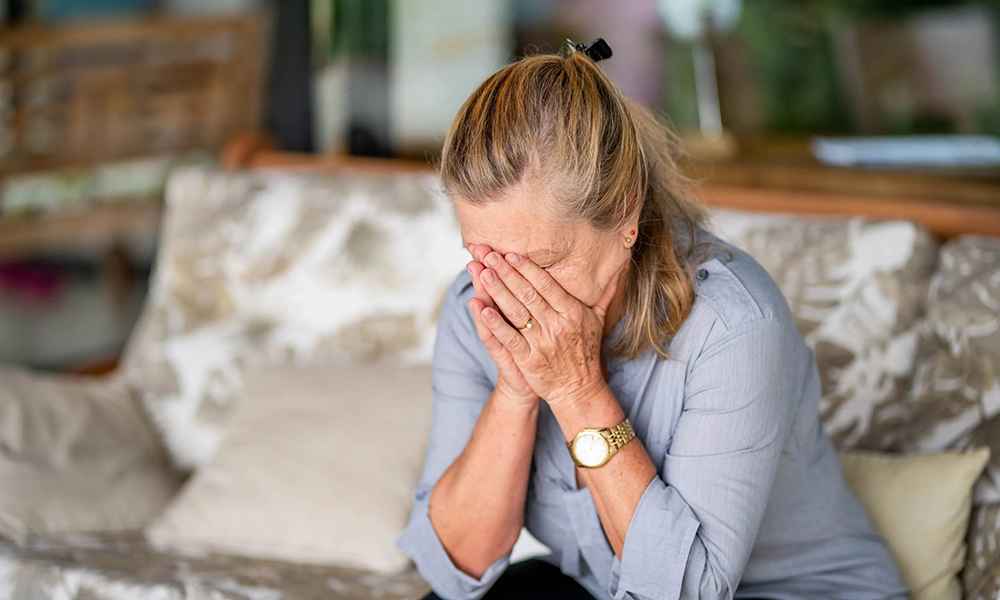
如果你在新冠康复之后,出现了新的心理健康问题,或者原有的心理疾病恶化,你并不孤单。虽然新冠病毒对心理健康的长期影响依旧是个迷,但自疫情爆发后的四年来,全球研究人员已经记录到感染新冠和心理健康恶化之间的联系。
现在,英国的科学家们有了新发现:新冠疫苗可以减轻新冠病毒对心理健康的负面影响。研究团队的成员包括布里斯托尔大学(Bristol)、剑桥大学(Cambridge)、牛津大学(Oxford)、斯旺西大学(Swansea)以及伦敦大学学院(University College London)等高校的研究人员。研究显示,未接种疫苗的人群在感染严重新冠后一年内,心理疾病的患病率更高。研究结果在周三发表于《美国医学会杂志·精神病学》(JAMA Psychiatry)。
布里斯托尔大学医学院流行病学高级研究员、本项研究的主要作者之一威尼西亚·沃克博士在新闻发布会上表示:“我们的研究结果对公共健康和心理健康服务的提供具有重要意义,因为严重的心理疾病与更高的健康护理需求和长期健康及其他不良影响相关。我们的结果凸显出普通人接种新冠疫苗的重要性,尤其是患有心理疾病的人群,因为他们感染新冠和出现不良结果的风险更高。”
这项观察性研究评估了在英格兰全科医生登记的超过1,860万名18至110岁的成年人(50%为女性;年龄中位数为49岁)的病例。在以疫苗尚未问世的疫情初期为中心的第一个研究队列中,约5%的患者被确诊感染新冠。另外两个队列代表了2021年6月至12月的疫苗接种时期:
疫苗接种者:1,400万人
女性:52%
年龄中位数:53岁
新冠确诊率:6%
未接种疫苗者:320万人
女性:42%
年龄中位数:35岁
新冠确诊率:5%
在三个队列中,研究人员分别对比了下列心理疾病在确诊新冠前后的发病率:
上瘾
抑郁症
进食障碍
普通焦虑症
创伤后应激障碍
自残
严重心理疾病(包括双极性障碍和精神分裂)
自杀
与感染新冠前或未感染新冠时对比,在确诊新冠后1至4周,大多数心理疾病的发病率升高。这种趋势主要适用于需要住院治疗的严重感染者和未接种疫苗的人群,在一年内发病率始终较高。
在轻度感染的新冠患者中,心理疾病的发病率小幅升高。例如,住院患者的抑郁症发病率升高了16倍,而未住院患者仅提高了1.2倍。虽然没有疫苗百分百有效,但接种新冠疫苗的目的是防止重症和死亡。研究人员指出,接种疫苗的队列,在感染前/未感染时或感染但未住院治疗后,抑郁症发病率没有太大变化。
新冠与心理疾病之间的关系,并没有因为人种和种族不同而发生显著变化。但不同年龄和生理性别群体之间确实存在差异。例如,这种联系在男性和老年人群体中更加明显。
虽然该项研究号称研究了较大的样本,但它存在局限性。数百万参与者来自一个国家,而且绝大多数人都是白人。研究人员还强调,他们仅分析了电子病历中记录的确诊感染者,这意味着未接受治疗的新冠阳性人群没有被包含在内。此外,研究人员不能排除新冠以外的其他病毒也可能导致研究中涉及的心理疾病。
研究的作者之一、布里斯托尔大学医学院的医疗统计学与流行病学教授乔纳森·斯特恩在新闻发布会上表示:“我们已经确认了新冠与心血管疾病、糖尿病和心理疾病之间的联系。我们将研究新冠病毒与肾脏疾病、自身免疫疾病和神经退行性疾病之间的联系,继续探索新冠的后果。”
新的新冠疫苗什么时候能够上市?
最新的2024-2025版新冠疫苗可能会在秋季初上市。美国疾病预防控制中心(Centers for Disease Control and Prevention,CDC)在6月份宣布,辉瑞(Pfizer)、莫德纳(Moderna)和诺瓦瓦克斯(Novavax)生产的疫苗,将在“今年晚些时候”上市。去年的疫苗上市时间是在9月中旬。
疾控中心建议,在新疫苗上市后,年龄超过6个月的所有人都应该接种一剂疫苗,以预防最新的奥密克戎亚变异株。免疫力低下和65岁及65岁以上的人群,可以额外接种疫苗。
美国疾控中心主任曼迪·科恩博士在6月份的新闻发布会上表示:“我们最重要的建议是通过接种疫苗,保护自己和亲人,避免患上呼吸道疾病。现在为自己和家人制定计划,在秋季呼吸道疾病高发季节到来之前接种最新的流感和新冠疫苗。”(财富中文网)
译者:刘进龙
审校:汪皓
如果你在新冠康复之后,出现了新的心理健康问题,或者原有的心理疾病恶化,你并不孤单。虽然新冠病毒对心理健康的长期影响依旧是个迷,但自疫情爆发后的四年来,全球研究人员已经记录到感染新冠和心理健康恶化之间的联系。
现在,英国的科学家们有了新发现:新冠疫苗可以减轻新冠病毒对心理健康的负面影响。研究团队的成员包括布里斯托尔大学(Bristol)、剑桥大学(Cambridge)、牛津大学(Oxford)、斯旺西大学(Swansea)以及伦敦大学学院(University College London)等高校的研究人员。研究显示,未接种疫苗的人群在感染严重新冠后一年内,心理疾病的患病率更高。研究结果在周三发表于《美国医学会杂志·精神病学》(JAMA Psychiatry)。
布里斯托尔大学医学院流行病学高级研究员、本项研究的主要作者之一威尼西亚·沃克博士在新闻发布会上表示:“我们的研究结果对公共健康和心理健康服务的提供具有重要意义,因为严重的心理疾病与更高的健康护理需求和长期健康及其他不良影响相关。我们的结果凸显出普通人接种新冠疫苗的重要性,尤其是患有心理疾病的人群,因为他们感染新冠和出现不良结果的风险更高。”
这项观察性研究评估了在英格兰全科医生登记的超过1,860万名18至110岁的成年人(50%为女性;年龄中位数为49岁)的病例。在以疫苗尚未问世的疫情初期为中心的第一个研究队列中,约5%的患者被确诊感染新冠。另外两个队列代表了2021年6月至12月的疫苗接种时期:
疫苗接种者:1,400万人
女性:52%
年龄中位数:53岁
新冠确诊率:6%
未接种疫苗者:320万人
女性:42%
年龄中位数:35岁
新冠确诊率:5%
在三个队列中,研究人员分别对比了下列心理疾病在确诊新冠前后的发病率:
上瘾
抑郁症
进食障碍
普通焦虑症
创伤后应激障碍
自残
严重心理疾病(包括双极性障碍和精神分裂)
自杀
与感染新冠前或未感染新冠时对比,在确诊新冠后1至4周,大多数心理疾病的发病率升高。这种趋势主要适用于需要住院治疗的严重感染者和未接种疫苗的人群,在一年内发病率始终较高。
在轻度感染的新冠患者中,心理疾病的发病率小幅升高。例如,住院患者的抑郁症发病率升高了16倍,而未住院患者仅提高了1.2倍。虽然没有疫苗百分百有效,但接种新冠疫苗的目的是防止重症和死亡。研究人员指出,接种疫苗的队列,在感染前/未感染时或感染但未住院治疗后,抑郁症发病率没有太大变化。
新冠与心理疾病之间的关系,并没有因为人种和种族不同而发生显著变化。但不同年龄和生理性别群体之间确实存在差异。例如,这种联系在男性和老年人群体中更加明显。
虽然该项研究号称研究了较大的样本,但它存在局限性。数百万参与者来自一个国家,而且绝大多数人都是白人。研究人员还强调,他们仅分析了电子病历中记录的确诊感染者,这意味着未接受治疗的新冠阳性人群没有被包含在内。此外,研究人员不能排除新冠以外的其他病毒也可能导致研究中涉及的心理疾病。
研究的作者之一、布里斯托尔大学医学院的医疗统计学与流行病学教授乔纳森·斯特恩在新闻发布会上表示:“我们已经确认了新冠与心血管疾病、糖尿病和心理疾病之间的联系。我们将研究新冠病毒与肾脏疾病、自身免疫疾病和神经退行性疾病之间的联系,继续探索新冠的后果。”
新的新冠疫苗什么时候能够上市?
最新的2024-2025版新冠疫苗可能会在秋季初上市。美国疾病预防控制中心(Centers for Disease Control and Prevention,CDC)在6月份宣布,辉瑞(Pfizer)、莫德纳(Moderna)和诺瓦瓦克斯(Novavax)生产的疫苗,将在“今年晚些时候”上市。去年的疫苗上市时间是在9月中旬。
疾控中心建议,在新疫苗上市后,年龄超过6个月的所有人都应该接种一剂疫苗,以预防最新的奥密克戎亚变异株。免疫力低下和65岁及65岁以上的人群,可以额外接种疫苗。
美国疾控中心主任曼迪·科恩博士在6月份的新闻发布会上表示:“我们最重要的建议是通过接种疫苗,保护自己和亲人,避免患上呼吸道疾病。现在为自己和家人制定计划,在秋季呼吸道疾病高发季节到来之前接种最新的流感和新冠疫苗。”(财富中文网)
译者:刘进龙
审校:汪皓
The COVID-19 vaccine may protect against SARS-CoV-2’s adverse effects on mental health, according to an analysis of more than 18.6 million adults by a team of researchers in the U.K.
You’re not alone if you’ve experienced new or worsening mental illness after recovering from COVID. While the coronavirus’s long-term consequences on mental health remain a mystery, in the four years since the pandemic’s onset, researchers worldwide have already documented a link between infection and mental health deterioration.
Now scientists in the U.K. have uncovered a new piece of the puzzle: COVID vaccination may mitigate the virus’s adverse effects on mental health. The team, including researchers from the universities of Bristol, Cambridge, Oxford, and Swansea, as well as University College London, showed higher rates of mental illnesses among unvaccinated people, up to a year after severe COVID infection. Their findings were published Wednesday in JAMA Psychiatry.
“Our findings have important implications for public health and mental health service provision, as serious mental illnesses are associated with more intensive health care needs and longer-term health and other adverse effects,” Venexia Walker, PhD, a senior research fellow in epidemiology at Bristol Medical School and one of the study’s lead authors, said in a news release. “Our results highlight the importance of COVID-19 vaccination in the general population and particularly among those with mental illnesses, who may be at higher risk of both SARS-CoV-2 infection and adverse outcomes following COVID-19.”
The observational study assessed the medical records of more than 18.6 million adults ages 18 to 110 (50% female; median age 49) who were registered with a general practitioner in England. In this first cohort, which centered on the pandemic’s early days before a vaccine was available, about 5% of patients had been diagnosed with COVID. Two other cohorts represented the vaccination era from June through December 2021:
Vaccinated: 14 million people
Female: 52%
Median age: 53
COVID diagnosis: 6%
Unvaccinated: 3.2 million people
Female: 42%
Median age: 35
COVID diagnosis: 5%
In each of the three cohorts, researchers compared incidence of the following mental illnesses before and after a confirmed COVID diagnosis:
Addiction
Depression
Eating disorders
General anxiety
Posttraumatic stress disorder
Self-harm
Serious mental illness (including bipolar disorder and schizophrenia)
Suicide
Compared to before or without COVID, the prevalence of most of these conditions increased one to four weeks following COVID diagnosis. This trend primarily applied to severe infections that had required hospitalization and among unvaccinated people, incidence remained elevated for up to a year.
Mental illness incidence increased slightly in COVID patients who endured milder infection. Depression rates, for example, spiked 16-fold among hospitalized patients but did so by just 1.2 times among nonhospitalized patients. While no vaccine is 100% effective, COVID immunization is intended to prevent severe illness and death. Researchers noted that the vaccinated cohort showed little variation in depression prevalence before/without or after nonhospitalized infection.
The link between COVID and mental illness didn’t change significantly between racial and ethnic groups. It did, however, vary by age and biological sex. For instance, this association was stronger among men and older age groups.
Despite boasting a large sample size, the study has its limitations. The millions of participants hailed from a single nation, and the vast majority were white. Researchers also stressed that they analyzed only confirmed infections recorded in electronic health records, meaning COVID-positive individuals who hadn’t sought medical care weren’t included. In addition, researchers couldn’t rule out that viruses besides SARS-CoV-2 hadn’t contributed to the mental illnesses studied.
“We have already identified associations of COVID-19 with cardiovascular disease, diabetes, and now mental illnesses,” Jonathan Sterne, PhD, study coauthor and professor of medical statistics and epidemiology at Bristol Medical School, said in the news release. “We are continuing to explore the consequences of COVID-19 with ongoing projects looking at associations of COVID-19 with renal, autoimmune, and neurodegenerative conditions.”
When will the new COVID vaccines be available?
Updated 2024–2025 COVID vaccines likely will be available in the early fall. Vaccines manufactured by Pfizer, Moderna, and Novavax will arrive “later this year,” the Centers for Disease Control and Prevention (CDC) announced in June. Last year’s version launched in mid-September.
When the new vaccines are available, the CDC recommends everyone aged 6 months and older get a dose to shield themselves from the latest Omicron subvariants. People with compromised immune systems and those 65 and older may be eligible for additional doses.
“Our top recommendation for protecting yourself and your loved ones from respiratory illness is to get vaccinated,” CDC Director Dr. Mandy Cohen said in a June news release. “Make a plan now for you and your family to get both updated flu and COVID vaccines this fall, ahead of the respiratory virus season.”






